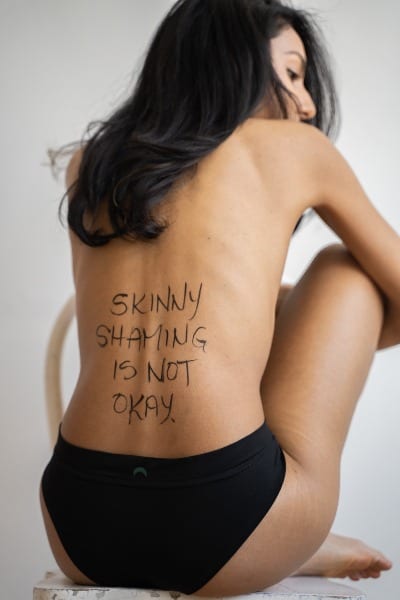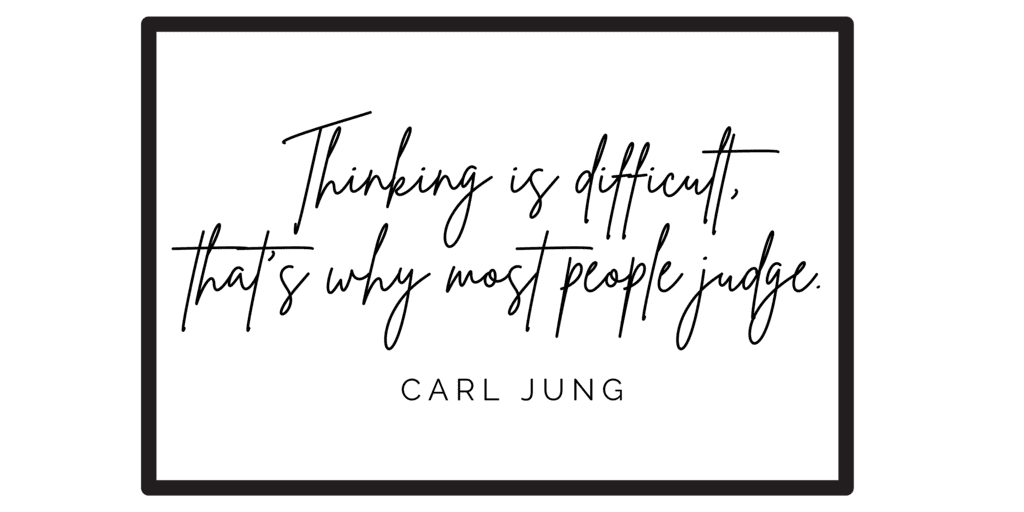 Body shaming is the act of negatively judging or humiliating someone based on the shape or size of their physical body. We all know what that means, right? We should never make someone feel bad about being overweight. Well, that’s certainly one part of it but I think it’s a bit short-sighted. Let me explain this a little better.
Body shaming is the act of negatively judging or humiliating someone based on the shape or size of their physical body. We all know what that means, right? We should never make someone feel bad about being overweight. Well, that’s certainly one part of it but I think it’s a bit short-sighted. Let me explain this a little better.
We can body shame for any reason. The fact that someone looks different from us in any way can make us judge or treat them unfairly: from different body sizes, skin or hair colors, body piercings, etc. It’s our human nature to see physical differences in others and assume things about them. But it’s wrong no matter what. Here’s the situation that brought this to mind for me.
My older sister recently had an encounter that she wanted to run by me and our other sister to get our viewpoint. She and her husband had been out to dinner with good friends and another couple was invited along that they didn’t know. Making conversation, the other woman asked my sister if she had any kids.
Both my sister and I had hormonal problems and a disease that prevented us from having any children. So my sister told her “no” that she was never able to. And based solely on that comment, the woman said matter-of-factly “Oh, that’s why you’re so skinny”. My eyes are bugging out just thinking about that comment! Why?
Because the woman automatically assumed my sister was thin due to life circumstances, not because of any effort on her part. She made up the details that suit her rather than asking about her situation. The real story is that my sister had a long and complicated history of weight and health challenges that other people could learn a lot from.
For whatever reason, this woman didn’t want to know those details. We all thought her comment was not just judgmental but dismissive. She wasn’t trying to be rude but she made it clear that she wasn’t interested in my sister’s actual story. When we assume things about another person all we’re doing is making things up to fill in for missing facts. And we learn nothing from that.
It’s just as common to judge someone that looks good to us as it is to judge someone who doesn’t, and it’s just as wrong. If we want to grow as humans we need to get the right answers from the source. Assumptions keep us from getting educated on any matter. So let’s get into some more details.
Body shaming the thin
I’m sure people will disagree with me, but I think body shaming the thin is just as bad as body shaming the overweight because it’s no different! Either way, we’re judging without knowing the truth. I would never assume that someone is overweight because they sit around all day eating donuts and drinking pop. I know that weight issues can be much more complicated than that.
At the same time, we shouldn’t assume that thin people never have to work to achieve their current weight. Every thin person doesn’t just have good genes and an easier time in life. They may have traveled a very bumpy road to get to where they are. Or something inspired them to change their habits so they could live a better quality of life. But more often than not there’s work involved.
Of course, it’s also not a fact that women who bear children will forever be overweight while childless women will forever be thin. That’s ridiculous! And I know some very fit mothers to prove it!
But let’s get on with my sister’s health journey.
My sister’s experience
My sister has worked really hard over the past 20 years or so to get back in shape again after going through a very rough time with the disease we share, endometriosis. So she would obviously like some credit for all the effort she’s put into getting healthy since then.
Because of this disease, my sister endured a lot of pain before having a total hysterectomy in her mid-30s. In the following year, due to recovery, a sedentary job, and poor eating, she gained 15 lbs. So she got serious about walking more, taking the stairs, and refusing to eat the free food that was often brought into her medical office. And she lost the weight.
But after another major life change and now struggling with early menopause she gained back 30 lbs. After going up “one more pant size” she realized that much more had to change, and forever if she was going to keep the weight off long-term. So she and her husband got a gym membership and hired a personal trainer that taught them how to work out to get results.
In addition to exercise, she started reading food labels and slowly cut back on dairy products, simple carbs, and the sugary sweets she and her husband were used to. She started eating oatmeal for breakfast and taking her lunch to work instead of eating what was brought in. Little by little she eliminated most of the processed junk from her diet and replaced it with healthier, more natural foods.
Related article: How to lose weight on a plant-based diet
These days, she and her husband eat a mostly whole (real) foods, plant-based diet, and she works out regularly at a local gym. The changes didn’t happen all at once, it took years of hard work, but it paid off. She got back to a healthy weight and with her new habits has been able to maintain it long-term.
So you can see why it’s so frustrating for her to have people judge her by her looks and assume that her life has been easier because of her current situation. She’s worked hard to get to where she is now and still works at it. But I guess admitting that it takes hard work means that someone else might have to admit they haven’t made enough changes. And most people don’t want to do that.
My experience
From my experience, it’s very common for people to attribute my thinness to a natural genetic blessing. Over the years I’ve heard things like “Well, you don’t have to worry about your weight”, or “You’ve got a high metabolism”. Both of which are assumptions that I don’t have to do anything to maintain a healthy weight.
I’ve also been asked, with skepticism, “Have you ever had a weight problem?”. As if I can’t understand weight loss without having been seriously overweight.
Again, I guess it makes people feel better to tell themselves that it’s “natural” for them to carry more weight and “natural” for me to be thin no matter what I do. My genes may allow me to stay in a lower weight range more easily than someone else. But I can assure you that if I still ate like I did in my 20s and didn’t exercise, I would resemble the average 51-year-old American woman.
I started changing my diet in my 30s because at that point I had gained about 18 lbs since high school. So I quit buying all the processed and frozen foods my husband and I were addicted to and I started cooking at home. I wasn’t much of a cook back then and it took a while to learn but I got better!
I also realized then that even though I’d always been pretty physically active I needed to start being more structured with my exercise routine. I used to walk a lot, then I moved on to biking because it was easier on my knees and hips. Eventually, I invested in an elliptical machine for indoors that I still use most days for my cardio. Then several years ago I started strength training regularly.
I may never have been in the “overweight” category but I didn’t have to be to see the direction I was headed. I knew if I didn’t start to change back then it would just be harder to do later. And I’m still making changes to stay healthy so it offends me when people assume it’s all just natural, or easier for me.
Related article: Why do cardio for exercise?
Health concerns in disguise
Once you start losing weight and getting healthy, another very interesting thing happens. People aren’t exactly happy for you! They start expressing “concern” over your “health” because you just don’t look like the average person anymore.
According to the CDC, nearly 74 percent of people in this country are overweight or obese. Since that’s what we’re used to seeing, I believe that someone at a healthy weight now appears too thin by comparison.
I once had a new church pastor take me aside and ask me if I had an eating disorder. He barely knew me! We hadn’t even had a real conversation at that point, but he thought it was ok to address this issue with me. At the time, I was actually up in weight and he was obese. I wonder how he would’ve reacted to me asking him about his weight problem?
It happens to men too!
My husband even experienced this phenomenon. He was at a company event getting caught up with a retiree that he hadn’t seen in years. Later on, this gentleman asked him if he was feeling OK because he “really looked thin”. Our perspectives have changed a bit on what healthy looks like!
My husband informed him that he had changed his eating habits and started working out regularly. And due to those changes, his weight went into the “healthy” category rather than “overweight” according to body mass index standards.
Related article: Understand BMI and how it relates to your health.
In this situation, my husband wasn’t the least bit offended at being asked if he felt OK. He actually took it as a compliment that people noticed he was thinner! Maybe that’s just the difference between men and women!
Women NOT supporting women
A good friend of mine once lost 50 lbs using a doctor-supervised weight loss plan. After reaching her goal weight her (overweight) female boss expressed her concern about her health since she’d lost “so much weight”. She assumed my friend had lost it by unhealthy means and thought it was her job to lecture her about it.
Her boss could’ve started the conversation by asking her how she lost the weight instead of assuming it was done in an unhealthy way. But she chose NOT to give her the benefit of the doubt and turned it into a negative and judgmental conversation souring that relationship.

Don’t expect support but learn to give it
My point is that everyone will not necessarily support us on our health journeys and they may not want to know any of the details. Many people will look for ways to sabotage you or drag you back down to their level so they can feel better about their own problems. Misery loves company!
People will even become “pushers” of the foods you’re trying to avoid. They say things like “Come on, it’s not that bad”, or “You can have a little, it’s not gonna kill you”, or even “You gotta have some fun in life”. Because, of course, you’re not fun if you don’t eat like most Americans. But this is not helpful or supportive.
If you know someone that’s working on losing weight and getting healthy again, support them in their efforts and be interested in how they’re doing it. That alone will give them encouragement to keep it up. Isn’t that what we all want anyway?
Education and motivation
I’m right there with my sister on the importance of reading labels. It helps tremendously to educate yourself about what’s in your food. I now buy more organic and cook mostly vegetables for our meals. And a lot of foods have been slashed from my regular diet after I read the labels!
Here’s another interesting fact. People have never asked me for advice on how to lose weight or get fit (and most still don’t!). I’ve noticed that when people want “help” with weight loss, they generally ask their overweight friends what they’re doing to try to lose weight or they turn to the latest quick-fix diet fad.
If you want help and motivation then talk to the people who are fit and see what they’re eating and doing for themselves, or just observe! They may be doing things you’re not doing and you could learn from their strategies. Emulate the people who are a step ahead of you, not the ones in the same boat or lagging behind.
With the changes my husband and I have made over the years we both feel stronger and healthier than ever before and rarely get sick. Our health choices are no longer based solely on weight control, that’s only one part of it. Our main motivation now is our long-term health and quality of life. So I motivate myself by reading or watching videos, health talks, and interviews.
My mother died of cancer at the age of 67 (a cancer she first got at the young age of 38). Both of my grandmothers also died of cancer (one at the age of 58) and my dad from T2 diabetes. With that family history, I want to do as much as possible to lower my own risk of disease and illness so I don’t go down the same path.
My final thoughts
We live in an extremely unhealthy country yet if you ask people they mostly still believe they’re “doing pretty good” with their diets and lifestyles. But according to the CDC, 6 out of 10 American adults have one chronic disease, and 4 out of 10 have at least two. Better nutrition and more physical activity could seriously lower these statistics and save us a lot of medical bills.
Unfortunately, the major improvements we want in our weight and health don’t come easily. It takes a lot of hard work to actually get healthy and control our weight. It takes being very different from the average person which is tough. Recognize that and be kind to all people when it comes to their looks.
I don’t believe that it’s ever ok to assume we know another person’s story based on one small piece of information. The woman in my sister’s story didn’t even realize she was making a judgment and shutting down the conversation. It was just natural for her to assume she already knew who my sister was.
So the next time you find yourself talking to someone who looks very fit, ask them how they do it. Not only will this be a nice compliment and great encouragement but you might actually learn something from them!

